Polyacrylamides Market Research, 2032
The global polyacrylamides market was valued at $5.0 billion in 2022, and is projected to reach $8.4 billion by 2032, growing at a CAGR of 5.5% from 2023 to 2032.
Report Key Highlighters:
The report provides competitive dynamics by evaluating business segments, product portfolios, target market revenue, geographical presence and key strategic developments by prominent manufacturers.
The global polyacrylamide market is fragmented in nature among prominent companies such as Ashland, BASF SE, SNF Group, China National Petroleum Corporation, Dow, Kemira, Solvay, Solenis, Mitsui Chemicals, Black Rose Industries Ltd., and ZL Group.
The study contains qualitative information such as the market dynamics (drivers, restraints, challenges, and opportunities), key regulation analysis, pricing analysis, and Porter’s five force analysis across North America, Europe, Asia-Pacific, LAMEA regions.
Latest trends in global polyacrylamide market such as undergoing R&D activities, regulatory guidelines, and government initiatives are analyzed across 16 countries in 4 different regions.‐¯
More than 3,200 polyacrylamide-related product literatures, industry releases, annual reports, and other such documents of key industry participants along with authentic industry journals and government websites have been reviewed for generating high-value industry insights for the global polyacrylamide market.
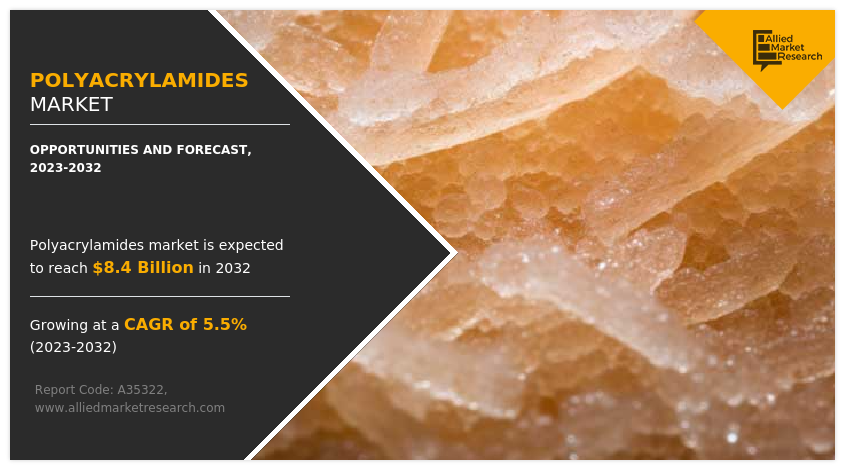
Polyacrylamide is a synthetic polymer made from acrylamide monomers. It is a type of water-soluble polymer with a linear structure, composed of repeating units of acrylamide. Polyacrylamide is known for its high-water solubility and is used in various industrial and environmental applications. Depending on the specific chemical groups attached to the polymer chain, polyacrylamides can be classified into nonionic, anionic, or cationic types. They are commonly employed as flocculants, aiding in the aggregation, and settling of particles in water, making them useful in water treatment, enhanced oil recovery, soil erosion control, and other processes.
One of the primary drivers of the polyacrylamides market is the increasing demand for water treatment solutions. With the global population on the rise and industrial activities expanding, there is a growing need for effective water management and purification. Polyacrylamides are used in water treatment processes for flocculation and sedimentation, helping to remove suspended particles and contaminants. The escalating concerns about water scarcity and the emphasis on sustainable water usage are propelling the adoption of polyacrylamides in water treatment applications.
Furthermore, in agriculture, polyacrylamides play a crucial role in soil conditioning and erosion control. They are utilized to improve soil structure, water retention, and nutrient delivery in agricultural fields. As the global population continues to grow, there is an increasing pressure to enhance agricultural productivity, and polyacrylamides contribute to achieving this by optimizing soil conditions and water management. Additionally, the awareness of sustainable farming practices has led to the adoption of polyacrylamides as part of environment-friendly agricultural solutions.
However, the polyacrylamides market is highly dependent on raw materials derived from petrochemical sources, particularly acrylonitrile and acrylic acid. Fluctuations in oil prices directly impact the production costs of polyacrylamides, leading to increased price volatility. Manufacturers face challenges in stabilizing their profit margins, and end-users may explore alternative solutions to avoid cost uncertainties. This volatility can deter market growth and hinder investment in the polyacrylamides sector.
On the contrary, in the oil and gas industry, polyacrylamides serve diverse purposes, such as enhanced oil recovery (EOR) and drilling muds. As the quest for oil and gas reserves becomes more challenging, the demand for technologies that maximize extraction efficiency grows. Polyacrylamides enhance the viscosity of water, facilitating better displacement of oil from reservoirs. Moreover, these polymers aid in controlling the rheological properties of drilling muds, contributing to the overall efficiency and success of drilling operations. With the continual exploration of unconventional oil and gas resources, the polyacrylamides market is poised for expansion.
The polyacrylamide market is segmented on the basis of product type, form, application, and region. On the basis of product type, the market is categorized into Non-ionic Polyacrylamide (NPAM), Anionic Polyacrylamide (APAM), Cationic Polyacrylamide (CPAM), Amphoteric Polyacrylamide, High Molecular Weight Polyacrylamide, and Cross-linked Polyacrylamide. By form, the market is classified into powder/granular, emulsion, and liquid. On the basis of application, it is divided into water treatment, enhanced oil recovery (EOR), papermaking, mining and mineral processing, personal care, food processing, and others. Region-wise, the market is studied across North America, Europe, Asia-Pacific, and LAMEA.
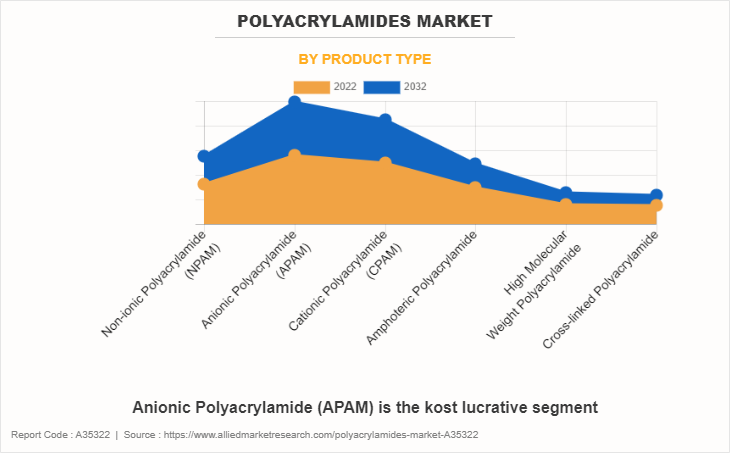
In 2022, the anionic polyacrylamide (APM) segment was the largest revenue generator during the forecast period. In municipal water treatment plants, APAM is used to enhance the settling of solids and improve the efficiency of sedimentation and filtration processes. This is particularly important in densely populated areas where the demand for clean water is high. Additionally, APAM finds applications in industrial wastewater treatment, helping industries comply with environmental regulations and minimize the environmental impact of their operations.
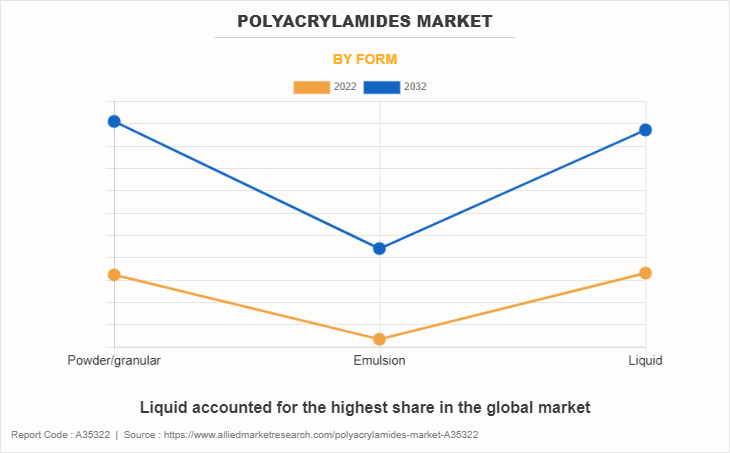
By form, the liquid segment dominated the global market in 2022, and is anticipated to grow at a CAGR of 5.4% during forecast period. One of the primary drivers for the increased demand for liquid polyacrylamide is its crucial role in water treatment processes. As the global population continues to grow, there is an escalating demand for clean and potable water. Liquid polyacrylamide is widely used as a flocculant in water treatment plants to facilitate the removal of suspended solids, organic matter, and other impurities. Its high molecular weight and ability to form large, dense flocs make it highly effective in the clarification and purification of water. With the intensification of industrial activities and urbanization, the need for advanced water treatment solutions has become more pronounced, contributing significantly to the rising demand for liquid polyacrylamide.
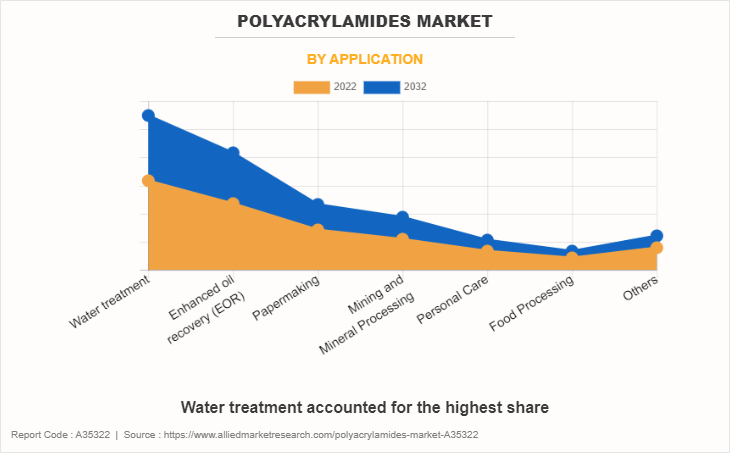
By application, the water treatment segment dominated the global market in 2022 and is anticipated to grow at a CAGR of 5.7% during the forecast period. Polyacrylamide is particularly valuable in water treatment due to its versatility and effectiveness in various applications. One of its key functions is as a flocculant, aiding in the aggregation and settling of suspended particles in water. This process is crucial for the removal of impurities, sediments, and other contaminants from wastewater, making it suitable for recycling or safe discharge into the environment.
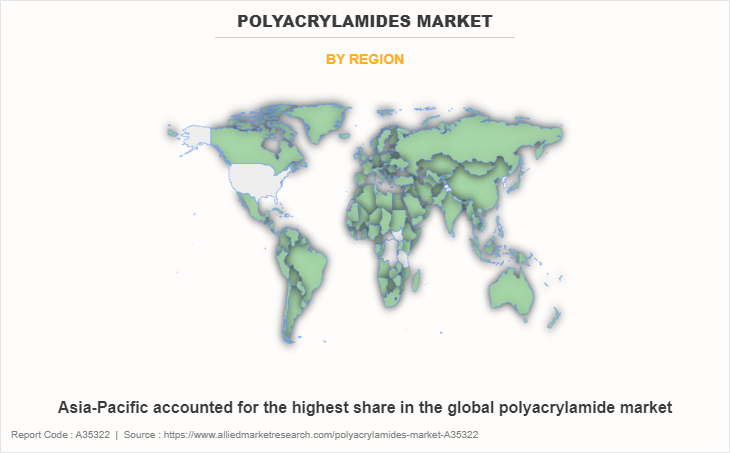
The Asia-Pacific polyacrylamide market size is projected to grow at the highest CAGR of 5.8% during the forecast period and accounted for 39.8% of polyacrylamide market share in 2022. Polyacrylamide is extensively used in water treatment processes, including wastewater treatment and purification of drinking water. With growing industrialization and urbanization in the Asia-Pacific region, the demand for effective water treatment solutions has been on the rise. Furthermore, the oil and gas industry utilizes polyacrylamide for enhanced oil recovery methods. As the demand for energy continues to increase in the Asia-Pacific region, the use of polyacrylamide in EOR processes may also grow.
The global polyacrylamide market profiles leading players that include Ashland, BASF SE, SNF Group, China National Petroleum Corporation, Dow, Kemira, Solvay, Solenis, Mitsui Chemicals, Black Rose Industries Ltd., and ZL Group.
Other key players involved in the manufacturing of polyacrylamide includes Anhui Jucheng Fine Chemical Co, Ltd., Shandong Polymer Bio-Chemicals Co., Ltd., Xitao Polymer Co., Ltd., Dongying Kechuang Biochemical Industrial Co., Ltd., and Dongying Kechuang Biochemical Industrial Co., Ltd. The global polyacrylamide market report provides in-depth competitive analysis as well as profiles of these major players.
Key Benefits For Stakeholders
- This report provides a quantitative analysis of the market segments, current trends, estimations, and dynamics of the polyacrylamides market analysis from 2022 to 2032 to identify the prevailing polyacrylamides market opportunities.
- The market research is offered along with information related to key drivers, restraints, and opportunities.
- Porter's five forces analysis highlights the potency of buyers and suppliers to enable stakeholders make profit-oriented business decisions and strengthen their supplier-buyer network.
- In-depth analysis of the polyacrylamides market segmentation assists to determine the prevailing market opportunities.
- Major countries in each region are mapped according to their revenue contribution to the global market.
- Market player positioning facilitates benchmarking and provides a clear understanding of the present position of the market players.
- The report includes the analysis of the regional as well as global polyacrylamides market trends, key players, market segments, application areas, and market growth strategies.
Polyacrylamides Market Report Highlights
| Aspects | Details |
| Market Size By 2032 | USD 8.4 billion |
| Growth Rate | CAGR of 5.5% |
| Forecast period | 2022 - 2032 |
| Report Pages | 504 |
| By Product Type |
|
| By Form |
|
| By Application |
|
| By Region |
|
| Key Market Players | ZL Group., Solenis, BASF SE, Ashland, DOW, Kemira, China National Petroleum Corporation, SNF Group, Mitsui Chemical Inc, Black Rose Industries Ltd., Solvay |
Analyst Review
According to the CXOs of leading companies, the awareness of environmental issues and the need for sustainable practices propel the adoption of polyacrylamide. Industries are increasingly focusing on eco-friendly solutions, and polyacrylamide, with its versatile applications in water treatment, agriculture, and other sectors, aligns with these sustainability goals.
Furthermore, macro-economic factors such as economic growth, industrial expansion, and infrastructure development also influence the polyacrylamide market. As economies grow, the demand for industrial processes requiring polyacrylamide increases, contributing to the overall market dynamics.
However, polyacrylamides face intense competition from alternative products and technologies. Natural polymers, such as guar gum and starch, and synthetic alternatives such as polyethylene oxide (PEO) compete with Polyacrylamides in various applications. The market's growth is constrained as industries seek cost-effective and sustainable alternatives that can provide similar or enhanced performance. The challenge lies in developing Polyacrylamide formulations that offer unique advantages, ensuring a competitive edge over substitutes.
Rise in demand for water treatment applications, robust demand for enhanced oil recovery process and growing awareness for sustainability are the upcoming trends of Polyacrylamides Market in the .world
Water treatment is the leading application of Polyacrylamides Market
Asia-Pacific is the largest regional market for Polyacrylamides
The global polyacrylamide market was valued at $5.0 billion in 2022 and is estimated to reach $8.4 billion by 2032, exhibiting a CAGR of 5.5% from 2023 to 2032.
Ashland, BASF SE, SNF Group, China National Petroleum Corporation, Dow, Kemira, Solvay, Solenis, Mitsui Chemicals, Black Rose Industries Ltd., and ZL Group. are the top companies to hold the market share in Polyacrylamides
Loading Table Of Content...
Loading Research Methodology...


